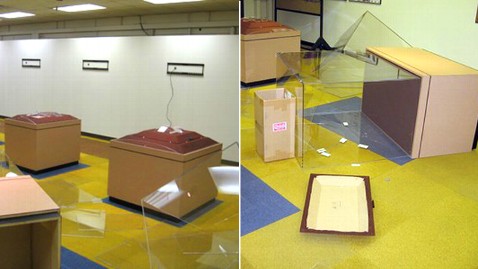Suspect Nabbed in N.C. Science Center Burglary

Thieves stole 100 precious rocks from Pisgah Astronomical Research Institute in Rosman, N.C. Image credit: Pisgah Astronomical Research Institute
Police have arrested one suspect and are seeking a second man in the Christmas Eve burglary of the Pisgah Astronomical Research Institute in Rosman, N.C., where the crooks made off with a trove of precious rocks from outer space.
Police arrested Brian Koontz, 29, of Balsam Grove, N.C. in connection with the case. He is being held at the Transylvania County Detention Facility on a $10,000 bail. Meanwhile, police believe his alleged accomplice, Robin Morris Baldwin Jr., 30, is still at large in Hendersonville.
"I'm still getting over a sickening feeling of our institution being violated," said Dr. David Clavier, vice president of Pisgah Astronomical Research Institute.
Museum photos show the damage done after two suspects knocked over plexiglass displays containing meteorites. The thieves snatched 100 meteorite artifacts and $100,000 worth of scientific and technology equipment including computer monitors, video projectors and telescopes.
Security cameras captured images of the two suspects breaking into the science institute.
"We're going to review our security and see what went right and what went wrong," said Lamar Owen, chief information officer for PARI. "We're going to go forward and restore things and continue to excite kids about science."
The suspects face charges of felony breaking and entering, conspiring to breaking and entering, felony larceny, conspiring to commit larceny and misdemeanor injury to personal property.
Transylvania Co. Sheriff Detective Wade Abram will meet with members of PARI today to evaluate and return some of the missing items. Police believe they were able to account for many of the stolen items, including some of the meteorites.
Clavier says these meteorite rocks are unique, one-of-a-kind objects that have been flying billions of years through space, landed somewhere on earth and have been collected from places like Antarctica, Australia, Russia and the U.S.
"It's an important and unique collection and the people who did this probably don't understand their value," he added.
Some science enthusiasts who collect meteorites sell them online through various outlets including eBay. Others will donate the findings to science. At PARI, the meteorites were on loan for science education.
Originally built as a NASA tracking station in the 1960s, PARI now operates as a not-for-profit foundation that specializes in STEM education which stands for Science, Technology, Engineering and Mathematics. Today, the foundation has a 200-acres home in the middle of the Pisgah National Forest.
"As a not-for-profit foundation, it's already difficult financially to operate the facility and this just makes it more difficult," said Clavier.